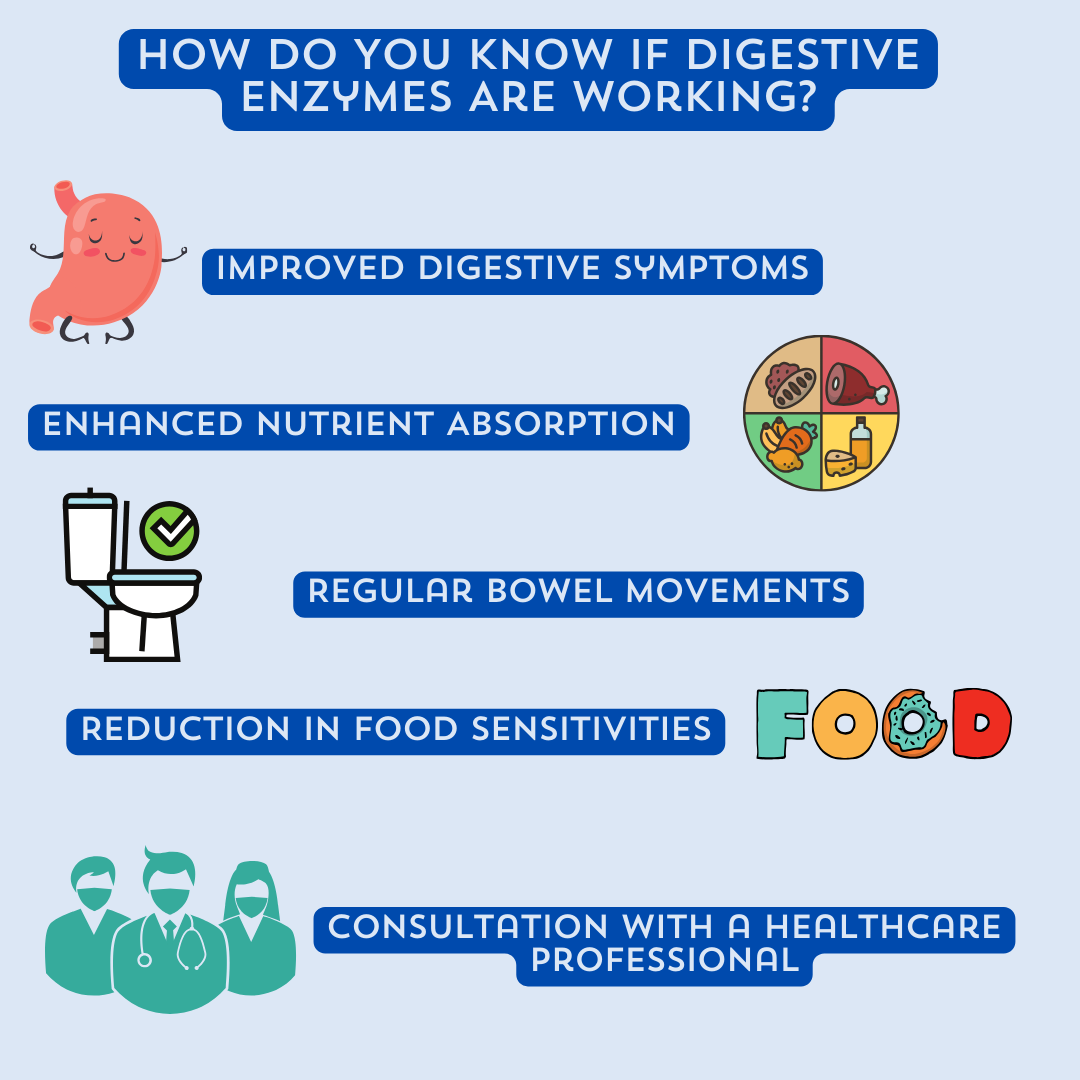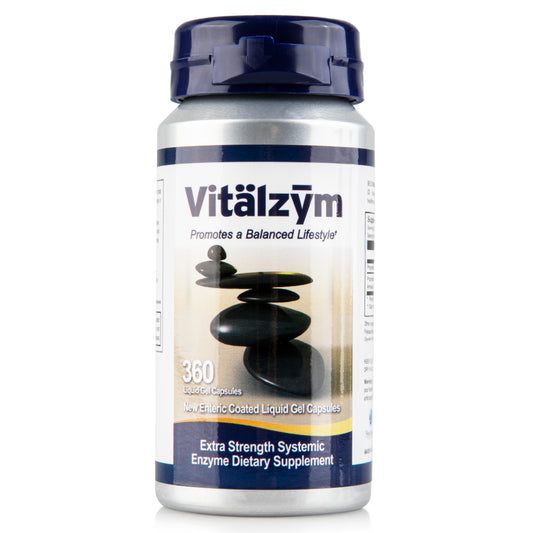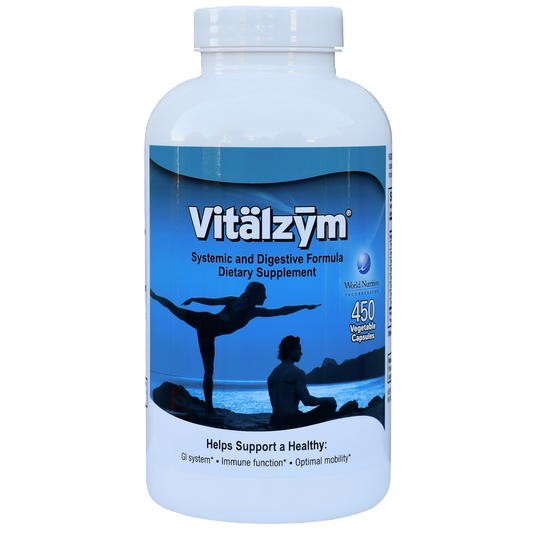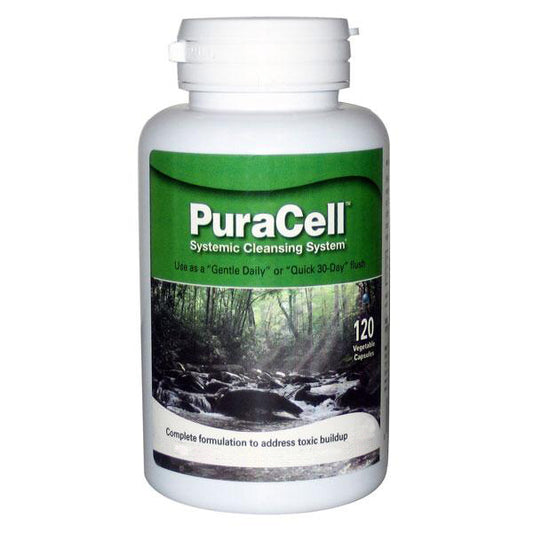If you're someone who values natural health remedies and wants to optimize your digestive health, understanding the effectiveness of digestive enzymes is essential. How long does it take for these enzymes to work? This question has intrigued health and wellness enthusiasts for years. In this authoritative article, we will dive deep into the world of enzyme digestion, exploring the factors that influence their effectiveness and shedding light on the timeline of their action. Get ready to unlock the secrets of digestive enzymes and discover how they can revolutionize your digestive well-being.
The Importance of Digestive Enzymes
Digestive enzymes play a crucial role in the breakdown and absorption of nutrients from the food we consume. These enzymes are responsible for breaking down complex molecules into smaller, more easily digestible forms that our bodies can absorb and utilize. Without sufficient digestive enzymes, our bodies may struggle to efficiently process and extract nutrients from the food we eat, leading to digestive discomfort, nutrient deficiencies, and overall poor digestive health. Understanding the importance of digestive enzymes is key to maintaining optimal digestive function and promoting overall wellness.
What Factors Affect The Effectiveness Of Digestive Enzymes?
pH Levels and Enzyme Activity
The pH levels in various parts of the digestive system have an impact on the effectiveness of digestive enzymes. Each enzyme has an optimal pH range in which it functions most efficiently. For example, pepsin, an enzyme involved in protein digestion, works best in the highly acidic environment of the stomach. On the other hand, pancreatic enzymes, such as amylase and lipase, function optimally in the slightly alkaline environment of the small intestine. Fluctuations in pH levels can affect the activity and effectiveness of these enzymes, potentially impacting the overall digestion process.
Types of Enzymes and Their Functions
Different types of digestive enzymes have specific functions in breaking down different types of nutrients. For example, amylase helps break down carbohydrates, proteases aid in protein digestion, and lipases assist in the breakdown of fats. The effectiveness of digestive enzymes can vary depending on the availability and balance of these different enzymes. Insufficient levels of specific enzymes can lead to incomplete digestion and nutrient malabsorption. Therefore, having a diverse range of enzymes and ensuring their proper balance is crucial for optimal digestive function.
Individual Variations in Digestion
Each individual has a unique digestive system, and factors such as age, genetics, and overall health can influence the effectiveness of digestive enzymes. Some individuals naturally produce higher levels of certain enzymes, while others may have deficiencies or imbalances. Additionally, certain health conditions, such as pancreatic insufficiency or gastrointestinal disorders, can affect enzyme production and function. Understanding these individual variations and addressing any deficiencies or imbalances can help optimize the effectiveness of digestive enzymes and promote better digestion and nutrient absorption.
How Long Does It Take For Digestive Enzymes To Work?
The time it takes for digestive enzymes to work can vary depending on several factors. Generally, once consumed, digestive enzymes start working almost immediately in the stomach and continue their action throughout the digestive tract. The specific duration of their effectiveness can depend on factors such as the type of enzyme, the pH levels in different parts of the digestive system, and individual variations in digestion. In some cases, the effects of digestive enzymes can be felt within minutes, while in others, it may take a few hours. It's crucial to remember that consistent and regular use of digestive enzymes according to a healthcare professional's advice can have long-term advantages for digestive health.
How Do You Know If Digestive Enzymes Are Working?
To determine if digestive enzymes are working effectively, consider the following indicators:
- Improved Digestive Symptoms: Pay attention to any changes in digestive symptoms such as bloating, gas, indigestion, or abdominal discomfort. If these symptoms lessen or disappear after starting enzyme supplementation, it may indicate that the enzymes are aiding in the digestion process.
- Enhanced Nutrient Absorption: Digestive enzymes help break down nutrients into smaller, absorbable forms. If you notice improvements in nutrient absorption, such as increased energy levels, improved skin health, or better overall well-being, it could be a sign that the enzymes are working effectively.
- Regular Bowel Movements: Digestive enzymes can contribute to regular bowel movements by promoting proper digestion and preventing constipation or diarrhea. If you experience more consistent and regular bowel movements after using digestive enzymes, it suggests that they are aiding in the digestive process.
- Reduction in Food Sensitivities: Enzyme deficiencies can contribute to food sensitivities or intolerances. If you notice a decrease in symptoms or improved tolerance to certain foods after using digestive enzymes, it indicates that the enzymes are helping to break down those specific nutrients more effectively.
- Consultation with a Healthcare Professional: If you are unsure about the effectiveness of digestive enzymes, it is always recommended to consult with a healthcare professional. They can assess your specific needs, evaluate your symptoms, and provide guidance on the appropriate use of digestive enzymes for your situation.
Monitoring improvements in digestive symptoms, such as reduced bloating, improved nutrient absorption, regular bowel movements, and decreased food sensitivities, can help assess the effectiveness of digestive enzymes. However, it is important to note that in some cases, digestive enzymes may cause nausea as a side effect. Therefore, it is crucial to seek guidance from a healthcare professional to determine the appropriate use and dosage of digestive enzymes for your specific needs and to address any potential adverse reactions.

What Are Protease In Digestive Enzymes?
Protease is a type of digestive enzyme that plays a crucial role in the breakdown of proteins during digestion. Proteins are complex molecules composed of amino acids, and they need to be broken down into smaller peptides and individual amino acids for proper absorption and utilization by the body. Protease enzymes work by cleaving the peptide bonds that hold proteins together, breaking them down into smaller, more manageable fragments. This process allows for efficient digestion and absorption of proteins, ensuring that the body can obtain the necessary amino acids for various physiological functions. Protease enzymes are naturally produced in the body, but they can also be obtained through dietary sources or as supplements to support optimal protein digestion and overall digestive health.
How Are Pancreas Related To Digestive Enzymes?
The pancreas plays a vital role in the production and release of digestive enzymes. It is responsible for producing and secreting various enzymes, including proteases, amylase, and lipase, into the small intestine. These enzymes are essential for the breakdown and digestion of proteins, carbohydrates, and fats, respectively. The pancreas releases these enzymes in response to hormonal signals triggered by the presence of food in the digestive system. Without the proper functioning of the pancreas and the release of these digestive enzymes, the body would struggle to effectively break down and absorb nutrients from the food we consume. Therefore, the pancreas and digestive enzymes are closely interconnected, working together to support the process of digestion and nutrient absorption.
Can Digestive Enzymes Heal Your Gut?
While digestive enzymes can play a beneficial role in supporting gut health, it is important to note that they are not a cure-all for gut-related issues. Digestive enzymes primarily aid in the breakdown and absorption of nutrients, which can indirectly contribute to a healthier gut environment. By improving digestion, they may help alleviate symptoms commonly associated with gut and body issues, such as bloating, gas, cramping, and pain. However, it is crucial to address the underlying causes of these symptoms, such as food intolerances, imbalances in gut bacteria, or gastrointestinal disorders, to truly heal the gut. Incorporating digestive enzymes as part of a comprehensive approach that includes a balanced diet, lifestyle modifications, and consultation with a healthcare professional can help promote gut healing and alleviate digestive discomfort.
Does Digestive Enzymes Help With Stomach Acid?
While digestive enzymes primarily aid in the breakdown and absorption of nutrients, they can indirectly help with stomach acid, bloating, and other related issues. Digestive enzymes can support the digestive process by breaking down food and proteins more efficiently, which can alleviate bloating and other digestive issues. By improving digestion, digestive enzymes can also help optimize metabolism, enzyme function, and nutrient absorption, helping ease the side effects of stomach acid. However, it's important to note that digestive enzymes do not directly affect stomach acid levels. If you have concerns about stomach acid or related conditions, it is recommended to consult with a healthcare professional for proper evaluation and guidance.
Can I Take Digestive Enzymes If I am Lactose Intolerance?
Yes, taking digestive enzymes can be beneficial for individuals with lactose intolerance. Lactose intolerance occurs when the body lacks the enzyme lactase, which is responsible for breaking down lactose, the sugar found in dairy products. Digestive enzyme supplements that contain lactase can help individuals with lactose intolerance digest lactose more effectively. By taking these enzymes before consuming dairy products, it can help prevent or reduce symptoms such as bloating, gas, and diarrhea that are commonly associated with lactose intolerance. However, it is important to consult with a healthcare professional to determine the appropriate dosage and timing of digestive enzymes for your specific needs.
How To Incorporate Digestive Enzymes Into Your Daily Routine
Here are some ways to incorporate digestive enzyme supplements into your daily routine:
- Consult with a healthcare professional: Before starting any new supplement, it is important to consult with a healthcare professional who can assess your specific needs and recommend the appropriate digestive enzyme supplement for you.
- Follow the recommended dosage: Read the instructions on the digestive enzyme supplement carefully and follow the recommended dosage. It is important not to exceed the recommended amount unless advised by a healthcare professional.
- Take digestive enzyme supplements with meals: Digestive enzyme supplements are most effective when taken with meals. Take the supplement just before or at the beginning of a meal to support the breakdown and absorption of nutrients.
- Consider timing for specific enzymes: Some digestive enzyme supplements work best when taken at specific times. For example, lactase enzyme supplements, which help digest lactose, are most effective when taken just before consuming dairy products.
- Be consistent: To experience the full benefits of digestive enzyme supplements, it is important to be consistent with their use. Incorporate them into your daily routine and take them regularly as recommended.
- Monitor your response: Pay attention to any changes in your digestion and overall well-being after incorporating digestive enzyme supplements into your routine. If you notice improvements in digestive symptoms or overall gut health, it may indicate that the supplements are working effectively for you.
- Adjust as needed: Everyone's digestive needs are unique, so it may be necessary to adjust the type or dosage of digestive enzyme supplements based on your response. Consult with a healthcare professional if you have any concerns or questions.
Remember, digestive enzyme supplements are a supplement and should be used as part of a comprehensive approach to digestive health, which includes a balanced diet, regular exercise, and other lifestyle modifications.
Conclusion
In conclusion, understanding the role and effectiveness of digestive enzymes is crucial for maintaining optimal digestive health. Digestive enzymes play a vital role in breaking down complex molecules into smaller, more easily digestible forms, allowing for efficient nutrient absorption. Factors such as pH levels, enzyme types, and individual variations in digestion can influence the effectiveness of digestive enzymes. Monitoring improvements in digestive symptoms, nutrient absorption, bowel movements, and food sensitivities can help determine the effectiveness of digestive enzymes. Incorporating digestive enzyme supplements into your daily routine, under the guidance of a healthcare professional, can provide support for individuals with specific digestive needs. Remember, digestive enzymes are part of a comprehensive approach to digestive health, which includes a balanced diet, lifestyle modifications, and consultation with a healthcare professional. By understanding and utilizing digestive enzymes effectively, individuals can optimize their digestive health and overall well-being.
Final Thoughts
Embrace a vibrant and healthier life with Vitalzym Extra Strength, an innovative systemic enzyme supplement created by World Nutrition. Harnessing the exceptional benefits of papain from papaya, this formula replenishes enzymes, boosts immune function, accelerates post-workout recovery, and promotes optimal circulation. With a potent blend of serrapeptase, bromelain, and other vital ingredients, Vitalzym paves the way to a transformative well-being experience.*
Sources
- https://www.betterhealth.vic.gov.au/health/conditionsandtreatments/digestive-system
- https://www.earth.com/news/healthy-humans-have-shockingly-different-digestive-systems/
- https://www.britannica.com/science/proteolytic-enzyme
- https://columbiasurgery.org/pancreas/pancreas-and-its-functions
- https://en.wikipedia.org/wiki/Gastric_acid
- https://cdhf.ca/en/understanding-lactose-intolerance-and-lactose-free-alternatives/
These statements have not been evaluated by the food and drug administration (FDA). These products are not intended to diagnose, treat, cure, or prevent any disease.







